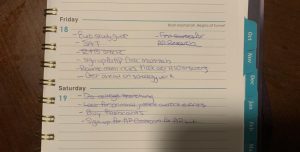How to Survive High School (Part I)
Tips on Time Management, Focus Strategies, Studying Help & More!

Photo by Creative Commons
Working in a hybrid model presents so many challenges for students. If you’re struggling, try some of these helpful tips for success.
School has just begun, and with that comes an overload of assignments that need to be done, projects that need completing, and so on and so forth. All of that work can be grueling, and sometimes it may feel like it is too much or there is not enough time in the day to get it done.
Everybody is different, and has strategies that help them, while others have an entire, intricate way of completing their assignments. Some things may work for you, and others may not. That is okay as long as you find a balance that helps you be the most productive and achieve the goals that you have set for yourself.
I contacted my friends, most of them being seniors, and asked them what has helped them survive high school work thus far. I also asked family and friends I have outside of Pat-Med to see what helps them. My friends and I have similar tools that work for us, and I also included tips that work for me that they didn’t say. Without further ado, here are a list of tips that will (hopefully) help you get the most work done in the smallest amount of time, and help you thrive in high school:
1.Even out your time—spend more time on the things that you do not understand, and less time on the things you do:
Do not spend your time just reviewing all of the information that is supposedly going to be on the quiz/test equally, this is just a huge time waster. Instead, be aware of the topics/subjects that are your strengths, and those that are your weaknesses. For example, say you have a chemistry test and you know the periodic table and its elements by heart, but you have a hard time understanding what isomers and isotopes are. Instead of making flashcards for the elements, make some for the isomers and isotopes instead, then before the test briefly review the periodic table. This saved you time, and by focusing on a weakness and learning it, now you have two strengths!
“By evening out my time with things I have trouble in, the more confident I am in that particular subject. Therefore, I am less likely to mess up on an exam or quiz. Also, I will better understand what is said in class during a class discussion. For example, in my history class last year, I devoted more time on that subject since that subject in particular has given me more trouble. As a result, I felt more engaged in class and more likely to avoid wrong answers on a quiz. It’s also important to save time for things you are more confident in but not too much where that’s the only thing you know. For me science is my strength so I took more time on history than science. In the end it proved to be successful.” ~Angel Herrera, 12th grade
2. Write the things that you need to get done in a planner or an agenda:
Although seemingly obvious, this tip actually works! Do not strictly rely on your memory, because it can fail you at times. You can get an agenda in the main office, or if you want something more artsy or with more features, just buy one in the store. They are usually organized by date, whereas the ones in the main office have different boxes for various subjects, with some may find helpful. Both do the job. Writing things down will help you to organize yourself, and to know what responsibilities you have and what work needs to be done. That way you will not accidently forget to complete an assignment, and this can further help with time management since you can plan when you will do each task.
“Writing things down in an agenda helps me because it allows me to not waste as much time as I would be tempted to do if I was going through my day without a clear plan. If I know I have a certain number of things to get to and I can see them all visibly on a list, it encourages me to get through all those items without wasting time. I used to just do things throughout the day without a plan and by the end of the day there would always be so much stuff I didn’t get to or stuff I forgot about. So writing down a list of things to do acts as a time management tool as well as a motivator for me.” ~Dillon Paul, 12th grade
3. Make sure your notes are neat:
I am sure we have all found ourselves in the same annoying dilemma where the teacher is talking really fast, or switching the slides too quickly, and you find yourself scribbling your notes in so you can get everything down. This is fine for class, but when you get home to study them, you may find yourself in a rut. If your notes are messy, and indecipherable this will without a doubt make it harder for you to study them. To be clear, I do not mean messy as in messy handwriting. Some people have neat handwriting, some are on the messier side, and some are somewhere in between. That is fine for school, the only thing that matters is that you can read them, well, you and your teacher. I mean messy as in some things are repeated in various sections, the content is not connected, you are jumping around topics, etc. Having organized notes will help you to retain the information better. Your notes do not have to be aesthetically pleasing, but they should be neat enough that you can study the information well. For me, if I find myself in the situation noted above, I will go home and rewrite my notes so I can easily understand them before the test comes.
4. Pay attention to due dates:
Too often, due dates are used as an excuse for procrastination. We have all done it, the whole “It’s not due until Friday, I still have a few days,” excuse. And while that may be true, getting things done before they are due can save you a lot of stress down the road. Doing them earlier, opens you up to more free time, allows you to space out assignments, and overall, just gives you peace of mind.
“Paying attention to due dates allows me to gather a time frame of when and what work needs to be done by when, and if it’s a lot, pace myself so I’m not overloaded with work in regards to more lengthy assignments. Especially with the online hybrid system right now, keeping myself updated on due dates allows me to complete work due for next week in a systematic sort of approach- I’m not overwhelmed by the amount of work I’m given, or surprised by assignments because I know exactly when they’re due and when I can complete some things sooner than others. I can also make time for specific work I have to do. This is also helpful with projects or assessments, by knowing the date I can plan and study accordingly. It’s a low effort way of staying on top of things, handing assignments in on time, and having a good idea of the amount of work I need to complete throughout the week without forgetting things or handing assignments in late.” ~Gabriella Vaccaro, 12th grade
5. Having a music playlist for a certain amount of time:
I feel like this tip best applies to breaks in between work, or before completing work. Music can serve as a sort of motivator and can help you get in the study grind mood. What songs are in your homework playlist? Comment down below! Some people say that listening to music while doing work helps keep them awake and submerged in the work, and that’s fine, as long as you don’t let it distract you. We actually discussed this in my AP Psych class last year. Mrs. Sweda debunked the whole multi-tasking theory and said it’s impossible to do and you just end up doing both activities with much less quality. So, if listening to music while doing work makes it more fun, just be self-aware, and make sure it does not hinder your work ethic.
“Having a music playlist keeps me calm and relaxed. When you set up a playlist for x number of minutes it might motivate you to finish your task before it ends. And it helps you keep track of time.” ~Natalia Lopez, 12th grade
6. Use the “Flora” app
This app, I kid you not, has been a lifesaver. It is a shame I only discovered it last year. And it is 100% free! This app is for people who have a hard time staying off their phone while doing work. First, pick an amount of time. This should be the amount of time you want to dedicate to doing strictly work, do not include any breaks. Enter the amount of time and then start planning your tree. Your phone does not necessarily need to be right next to you, in fact it would be better to keep it as far away from you as possible to resist the temptation of picking it up. Your phone should stay on, the app always on your screen while working, so charging your phone while using the app is a good idea. The way the app works is that if you exit the app, to go to Instagram for example, the tree dies. You should not want the tree to die, so if you feel as if you would not care, this app is not for you. Planting trees is free but can also add an amount when planting the tree, and that money will be donated to planting real-life trees, so you can focus and help the environment! That sounds like a win-win to me.
7. Stay away from your bedroom and work someplace quiet:
Your room is full of distractions, so stay away from it. You do so many things in your room, so separate your work from all of that. Some people like working on their bed, but that can promote sleepiness and you may find yourself dozing off easily. Try to stray away from your bedroom and find some other quiet and clean place to work to optimize your study habits and focus more.
“I easily get distracted and I do almost everything in my bedroom, and if I need to get any work done I’ll work somewhere else so I don’t get distracted or start procrastinating.” ~Dalia Hagoug, my best friend extraordinaire
“Working some place quiet helps me stay productive because it allows me to put all of focus on my work, which helps me learn more efficiently and finish my assignments much quicker. When there’s other noises, it becomes much harder to only focus on my school work.” ~Ruth Amador, 12th grade
8. Record yourself while studying:
The only way to improve is to increase your self-awareness. Pick up on the things you can improve on and your weaker areas and strive to improve. If you come to the realization that you are spending way too much time studying, figure out why that is, and how you can cut down that time, and create more time for relaxation and other activities. Recording yourself while studying is one way to catch your mistakes and prevent them from occurring again in the future.
“It may sound really dumb but I record myself studying, not only does this prohibit me from using my phone, I get to analyze my study habits when I do so.” ~Ethan Phan, 12th grade
9. Make sure your body is as awake as it can be:
For me, if I know I have some big test the next day, I will make myself a coffee to get ready for a study grind. Of course, you should not rely on caffeine or energy drinks every single time you study but using them once in a while is totally fine. There is no point studying when you are tired because your brain will not retain the information well. You will end up wasting a whole bunch of time for nothing. Instead, take a small nap and try again. Or if you cannot, take a small energy drink. Studying while tired, is not studying and will not give you the results you want.
10. Utilize the app “Libby”
I previously wrote an article on how to navigate and use the Libby app, you can find it here. On the Libby app you can download books and audiobooks. This app is especially helpful for English. If you are someone who prefers reading things by scrolling through them, this app may be for you. I used this app many times last year. For AP Lang, we had to read a lot of the assigned books at home. What I used to do was borrow the book we were reading as an e-book on Libby. That way I could read the text while on the go, so I could finish it much faster. If you find listening to books easier, you can do the same thing, just download the audiobook version of the book. The app also has review books that you can download, which can be super helpful. You may also be lucky and find textbooks you are using in class on there as well. In summary, the app has many useful features and an extensive catalog that can help tremendously with your schoolwork.
11. Taking breaks in between doing work:
Being productive, does not necessarily mean working non-stop. If you do that, you are going to burn out, and that is just not good for your health overall. Taking breaks in between chunks of work allows you to take a breather and rest your mind. Studies even show that taking breaks in between work helps you to retain the information far better. But make sure to not turn a ten-minute break in to an hour! This will significantly decrease your productivity and disrupt your focus. Take short breaks and remember to get back to work after to improve time management.
“This really applies to me when I have a good 3+ hours of work but I get super stressed or straight up angry at my workload and I find that taking half an hour to eat, watch YouTube, or doing anything else to take my mind of homework for half an hour really helps. Afterwards I’m more mentally stable if that makes any sense and with that stability, I can work more productively which is important for my mental sanity but also the quality of my work.” ~Jeffrey Tejada, 12th grade
Comment down below if you use any of these tips, or if you found any helpful! Also, look out for parts two and three—coming soon!







